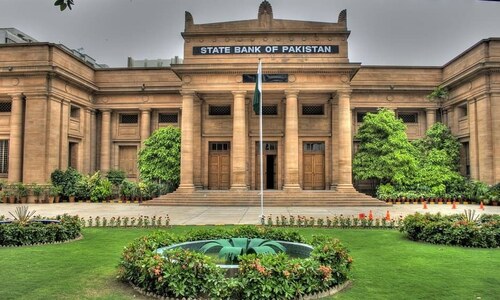Tradeoff in macroeconomic stability and economic challenges can be successfully achieved with the collaboration of the finance ministry and the State Bank of Pakistan (SBP). Much is needed to understand central bank independence, why is it required, its role in the economy and its management.
Pakistan is far behind from the perspectives of politics, economics, and intentions to select and implement policy variables required for achieving the SBP independence. This is because of the excessive role of the government specially and specifically, the finance ministry in the affairs of the State Bank. This can be validated from the SBP Act of 1956, Monetary and Fiscal Policy Coordination Board, and Monetary Policy Framework.
The International Monetary Fund demands implementation of best international economic practices for one of the most important public institutions, based on research conducted on time inconsistency of monetary policy, hence resulting in independent central banks of the US, Canada, Europe, Japan, Australia, and New Zealand, wherein, central banks moved away from Discretionary Monetary Policy towards Rules-Based Monetary Policy.
So, the first aspect of independence is the conduct of rules-based monetary policy rather than discretionary. The State Bank, however, enjoys operational autonomy in selecting appropriate instruments to achieve given targets of inflation, interest, exchange rates, and soundness of the financial sector.
In Pakistan, the governments have always ignored international best practices of independence and compromised efficient monetary policy of price stability and inflation targeting
The federal government, in pursuit of higher-than-potential growth and target rates of inflation, always deviated from the real targets. The State Bank sets a target for M2 money growth rate, which has exceeded frequently, as actual rates of inflation and M2 money growth rates remained well above the set target and desired international level of 3 per cent, suggesting imperfection and conduct of monetary policy on an ad hoc basis.
Globally, the legal characteristics of independence as stated in the charter of the central bank are grouped into four segments, i) the appointment, dismissal, and term of office of the central bank governor, ii) the policy formulation and resolution of conflicts between the executive branch and the central bank over monetary policy, and the participation of the central bank in the budget process, iii) the objective(s) of the central bank iv) the central bank’s ability to put restrictions on lending to the public sector.
These four segments are further sub-divided into sub-variables according to their assigned weights to arrive at a value of independence of a specific central bank. The more the value is closer to 1, the more is the independence of a central bank. For Pakistan, we have carefully conducted, seventy years of decade-wise examination and quantification of these variables, arriving at a value of 0.40 ie marginally independent as of the year 2020.
This has improved from 0.21 as of 2000 ie low independent, derived by earlier research of Cukierman, Webb and Neyapati. Some of the variables of independence that Pakistan deviates from as compared to the international standards are; 1) The SBP governor is appointed for three years for two terms subject to the age limit of 65 years against the international practice — the longer the tenor of the governor, the higher the level of independence. This aspect draws a very important and simple statistical result, that the higher the tenor of the governor, the lower would be the inflation.
In the case of Pakistan, from 1959 to 2019, the average tenor of each governor was 3.26 years and the average inflation was 8.68pc. In an individual study of the tenor of each governor as against inflation during their period, we find that the lower the tenor of the governor, the higher was inflation and vice versa. 2) The ultimate targets of SBP is monetary stability, soundness and stability of the financial sector and optimum utilisation of productive resources, against the international standards of inflation targeting, 3) more than one objective of SBP, against a single target of inflation targeting 4) loose limitations on government borrowings and 5) monetary policy preference parameters.
Almost all variables were and are always used politically by the governments in Pakistan to justify their stay, thereby damaging the credibility of the Central Bank. Having said above, the governments have always ignored international best practices of independence and compromised efficient monetary policy of price stability and inflation targeting.
There is now a considerable agreement among policymakers, researchers, and monetary policy experts that flexible inflation targeting is the best compromise for monetary policy, instead of strict inflation targeting and strict output targeting. With this, there is also a general agreement that inflation-targeting central banks in industrialised countries conduct monetary policy in this way.
The aim is to stabilise inflation around the inflation target and also to stabilise output around potential output, because of the tradeoff, unpredictable and uncertain shocks, and unavoidable imperfect control there will always remain some variability in both inflation and output.
The government’s rhetoric of higher growth rate during their tenor were and are, based on the compromised monetary policy, resulted in the shape of inflation variability. Wherein, the policymaker’s preference was always output stability by giving more weight to output variability as against inflation variability, because of the preference given to output variability.
Published in Dawn, The Business and Finance Weekly, January 31st, 2022














































